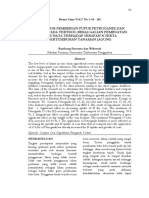Title - The Impo-WPS Office
Title - The Impo-WPS Office
Uploaded by
pajaresaizel272Copyright:
Available Formats
Title - The Impo-WPS Office
Title - The Impo-WPS Office
Uploaded by
pajaresaizel272Original Description:
Original Title
Copyright
Available Formats
Share this document
Did you find this document useful?
Is this content inappropriate?
Copyright:
Available Formats
Title - The Impo-WPS Office
Title - The Impo-WPS Office
Uploaded by
pajaresaizel272Copyright:
Available Formats
Title: The Importance of Renewable Energy for Sustainable Development
Introduction:
Renewable energy has emerged as a critical solution to address the challenges posed by climate change
and the depletion of fossil fuel resources. This position paper aims to highlight the significance of
renewable energy in achieving sustainable development and advocate for its widespread adoption. By
exploring the environmental, economic, and social benefits of renewable energy, we can pave the way
for a cleaner, more resilient future.
1. Environmental Benefits:
Renewable energy sources, such as solar, wind, hydro, and geothermal power, offer significant
environmental advantages over traditional fossil fuels. They produce little to no greenhouse gas
emissions, reducing the carbon footprint and mitigating climate change. By transitioning to renewable
energy, we can decrease air pollution, improve air quality, and protect ecosystems, thereby
safeguarding the planet for future generations.
2. Economic Advantages:
Investing in renewable energy presents substantial economic opportunities. The renewable energy
sector has the potential to create jobs, stimulate economic growth, and enhance energy security. By
shifting towards renewable sources, countries can reduce their dependence on imported fossil fuels,
stabilize energy prices, and foster local industries. Moreover, the renewable energy sector encourages
innovation and technological advancements, driving economic competitiveness and attracting
investment.
3. Social Implications:
Renewable energy has positive social implications, particularly in terms of access to energy, health, and
community development. In regions with limited access to electricity, renewable energy technologies
can provide clean and affordable power, improving living conditions and enabling educational and
economic opportunities. Additionally, the decentralized nature of renewable energy systems empowers
communities to generate their own energy, fostering energy independence and resilience.
4. Policy and Regulatory Framework:
To accelerate the transition to renewable energy, governments should establish supportive policy and
regulatory frameworks. This includes implementing renewable energy targets, providing financial
incentives and subsidies, streamlining permitting processes, and promoting research and development.
Collaboration between governments, private sector entities, and civil society is crucial to create an
enabling environment for renewable energy deployment.
5. Education and Awareness:
Raising public awareness and promoting education about renewable energy are vital for its widespread
adoption. Educational institutions should integrate renewable energy topics into their curricula,
fostering a culture of sustainability and empowering future generations. Public awareness campaigns
can inform individuals about the benefits of renewable energy, encouraging behavioral changes and
promoting energy conservation.
Conclusion:
Renewable energy represents a sustainable and viable solution to address the challenges of climate
change, energy security, and economic development. By embracing renewable energy sources, we can
mitigate environmental degradation, stimulate economic growth, and improve social well-being.
Governments, businesses, and individuals must collaborate to create a supportive policy environment,
invest in research and development, and promote education and awareness. Embracing renewable
energy is not only a responsibility but also an opportunity to build a cleaner, more sustainable future for
ourselves and future generations.
You might also like
- The Subtle Art of Not Giving a F*ck: A Counterintuitive Approach to Living a Good LifeFrom EverandThe Subtle Art of Not Giving a F*ck: A Counterintuitive Approach to Living a Good LifeRating: 4 out of 5 stars4/5 (5891)
- The Gifts of Imperfection: Let Go of Who You Think You're Supposed to Be and Embrace Who You AreFrom EverandThe Gifts of Imperfection: Let Go of Who You Think You're Supposed to Be and Embrace Who You AreRating: 4 out of 5 stars4/5 (1103)
- Never Split the Difference: Negotiating As If Your Life Depended On ItFrom EverandNever Split the Difference: Negotiating As If Your Life Depended On ItRating: 4.5 out of 5 stars4.5/5 (870)
- Grit: The Power of Passion and PerseveranceFrom EverandGrit: The Power of Passion and PerseveranceRating: 4 out of 5 stars4/5 (597)
- Hidden Figures: The American Dream and the Untold Story of the Black Women Mathematicians Who Helped Win the Space RaceFrom EverandHidden Figures: The American Dream and the Untold Story of the Black Women Mathematicians Who Helped Win the Space RaceRating: 4 out of 5 stars4/5 (912)
- Shoe Dog: A Memoir by the Creator of NikeFrom EverandShoe Dog: A Memoir by the Creator of NikeRating: 4.5 out of 5 stars4.5/5 (543)
- The Hard Thing About Hard Things: Building a Business When There Are No Easy AnswersFrom EverandThe Hard Thing About Hard Things: Building a Business When There Are No Easy AnswersRating: 4.5 out of 5 stars4.5/5 (352)
- Elon Musk: Tesla, SpaceX, and the Quest for a Fantastic FutureFrom EverandElon Musk: Tesla, SpaceX, and the Quest for a Fantastic FutureRating: 4.5 out of 5 stars4.5/5 (474)
- Her Body and Other Parties: StoriesFrom EverandHer Body and Other Parties: StoriesRating: 4 out of 5 stars4/5 (830)
- The Sympathizer: A Novel (Pulitzer Prize for Fiction)From EverandThe Sympathizer: A Novel (Pulitzer Prize for Fiction)Rating: 4.5 out of 5 stars4.5/5 (122)
- The Emperor of All Maladies: A Biography of CancerFrom EverandThe Emperor of All Maladies: A Biography of CancerRating: 4.5 out of 5 stars4.5/5 (272)
- The Little Book of Hygge: Danish Secrets to Happy LivingFrom EverandThe Little Book of Hygge: Danish Secrets to Happy LivingRating: 3.5 out of 5 stars3.5/5 (414)
- The Yellow House: A Memoir (2019 National Book Award Winner)From EverandThe Yellow House: A Memoir (2019 National Book Award Winner)Rating: 4 out of 5 stars4/5 (99)
- The World Is Flat 3.0: A Brief History of the Twenty-first CenturyFrom EverandThe World Is Flat 3.0: A Brief History of the Twenty-first CenturyRating: 3.5 out of 5 stars3.5/5 (2270)
- Devil in the Grove: Thurgood Marshall, the Groveland Boys, and the Dawn of a New AmericaFrom EverandDevil in the Grove: Thurgood Marshall, the Groveland Boys, and the Dawn of a New AmericaRating: 4.5 out of 5 stars4.5/5 (269)
- Team of Rivals: The Political Genius of Abraham LincolnFrom EverandTeam of Rivals: The Political Genius of Abraham LincolnRating: 4.5 out of 5 stars4.5/5 (235)
- A Heartbreaking Work Of Staggering Genius: A Memoir Based on a True StoryFrom EverandA Heartbreaking Work Of Staggering Genius: A Memoir Based on a True StoryRating: 3.5 out of 5 stars3.5/5 (232)
- On Fire: The (Burning) Case for a Green New DealFrom EverandOn Fire: The (Burning) Case for a Green New DealRating: 4 out of 5 stars4/5 (74)
- The Unwinding: An Inner History of the New AmericaFrom EverandThe Unwinding: An Inner History of the New AmericaRating: 4 out of 5 stars4/5 (45)
- 3620 2013Document2 pages3620 2013Jnrules123No ratings yet
- Rosebel Gold Mine Including The Saramacca Property 5112019 TRDocument355 pagesRosebel Gold Mine Including The Saramacca Property 5112019 TRRichard R M ThodéNo ratings yet
- Natural Resources Are Resources That Exist Without Actions of HumankindDocument4 pagesNatural Resources Are Resources That Exist Without Actions of HumankindOOthaNo ratings yet
- Why Life On Land Is ImportantDocument5 pagesWhy Life On Land Is ImportantSmiley MovementNo ratings yet
- Deforestation ProjectDocument13 pagesDeforestation Projecturielsade100% (1)
- Thesis On Deforestation in EthiopiaDocument8 pagesThesis On Deforestation in Ethiopiagbxm8h7g100% (1)
- The Effect of Overconsolidation On The Behaviour of Clays During Shear-HenkelDocument12 pagesThe Effect of Overconsolidation On The Behaviour of Clays During Shear-HenkelAnonymous GnfGTwNo ratings yet
- Est MCQDocument962 pagesEst MCQDeepali PawarNo ratings yet
- Pengaruh Pemberian Pupuk Petroganik Dan Kompos Pada Vertisol Bekas Galian Pembuatan Batu Bata Terhadap Serapan N Serta Pertumbuhan Tanaman JagungDocument8 pagesPengaruh Pemberian Pupuk Petroganik Dan Kompos Pada Vertisol Bekas Galian Pembuatan Batu Bata Terhadap Serapan N Serta Pertumbuhan Tanaman JagungkartikaNo ratings yet
- Nitrogen Levels in The Piracicaba River in São Paolo, BrazilDocument15 pagesNitrogen Levels in The Piracicaba River in São Paolo, BrazilNiket ShahNo ratings yet
- IJIRAE:: Comparision of Water Quality Index of Rajghat Dam & Lakha Banjara Sagar LakeDocument3 pagesIJIRAE:: Comparision of Water Quality Index of Rajghat Dam & Lakha Banjara Sagar LakeIJIRAE- International Journal of Innovative Research in Advanced EngineeringNo ratings yet
- List of Philippines Power PlantsDocument13 pagesList of Philippines Power Plantsskypirate10100% (1)
- Metamorphic RockDocument6 pagesMetamorphic Rockapi-245511282No ratings yet
- Questionnaire Depletion Natural ResourcesDocument5 pagesQuestionnaire Depletion Natural ResourcesKaye Claire EstoconingNo ratings yet
- Characteristics of High Temperature Carbonat Hosted Massive Sulphide Ores United States, Exico and PeruDocument30 pagesCharacteristics of High Temperature Carbonat Hosted Massive Sulphide Ores United States, Exico and Perujunior.geologiaNo ratings yet
- 3-Site Analysis - Natural Factors Part 4Document42 pages3-Site Analysis - Natural Factors Part 4Catherine Joy TagsipNo ratings yet
- Asejire Dam and The Host Communities: T. D. T. OyedotunDocument11 pagesAsejire Dam and The Host Communities: T. D. T. OyedotunDavid AguoruNo ratings yet
- Rain Water HarvestingDocument24 pagesRain Water Harvestingrocking sharathNo ratings yet
- Paragraph On Save TreesDocument2 pagesParagraph On Save TreesVidya BudihalNo ratings yet
- Triaxial PDFDocument62 pagesTriaxial PDFSuhil YadavNo ratings yet
- Natural ResourcesDocument57 pagesNatural Resourcessteodoro012No ratings yet
- Asad Mushtaq: Roll No. BCOF19M004. Topic:Agriculture Sector Course: Economics Issues ofDocument13 pagesAsad Mushtaq: Roll No. BCOF19M004. Topic:Agriculture Sector Course: Economics Issues ofAsad MushtaqNo ratings yet
- Land&Water ResourcesDocument20 pagesLand&Water Resourcesswainananta336No ratings yet
- Science Chapter 16 Water: A Precious ResourceDocument2 pagesScience Chapter 16 Water: A Precious ResourceHarshit TiwariNo ratings yet
- Water and Related Statistics-2013 PDFDocument212 pagesWater and Related Statistics-2013 PDF8790922772No ratings yet
- Bunker SuppliersDocument17 pagesBunker SuppliersgbhatikarNo ratings yet
- Growing Cocoyams in Nigeria: Commercial Crop Production Guide SeriesDocument4 pagesGrowing Cocoyams in Nigeria: Commercial Crop Production Guide SeriesejoghenetaNo ratings yet
- Collective Action For Forest Management, Challenges and Failures: Review Paper From Ethiopia in ParticularDocument8 pagesCollective Action For Forest Management, Challenges and Failures: Review Paper From Ethiopia in ParticularPremier Publishers100% (1)
- Assignment 4 - Forest Resources Severe DepletionDocument2 pagesAssignment 4 - Forest Resources Severe Depletionbrandonjoseph7302No ratings yet
- Napier CV Pakchong 1Document8 pagesNapier CV Pakchong 1Inka Novia TunggadewiNo ratings yet






































































